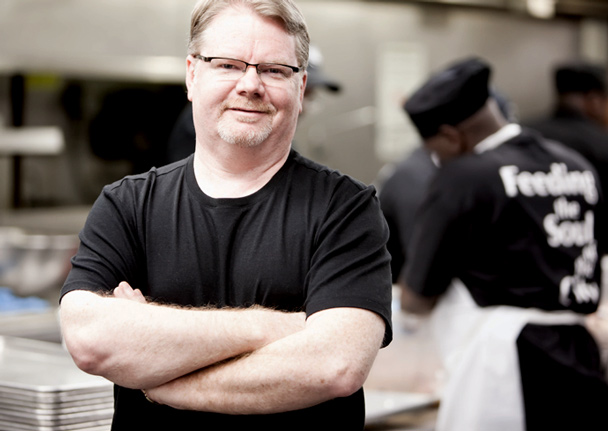Since its founding in 1989, D.C. Central Kitchen has dished out 25 million meals to kids, the homeless, and the food-insecure, and has helped more than 1,000 men and women get jobs in the restaurant industry. The nonprofit's mission is to strengthen bodies, empower minds, and build communities by combating hunger, aiding nutrition, and improving the lives of the out-of-work. We asked CEO Michael F. Curtin, Jr., what's cooking at the Kitchen and why it's become a model for other programs around the country and beyond.
Gourmet Live: How did you first get involved in D.C. Central Kitchen?
Michael Curtin: I started in the hospitality biz in D.C., at the Hay-Adams Hotel, in 1989, the same year Robert Egger opened D.C. Central Kitchen. I got to know Robert, and when I opened my own restaurant in 1998, D.C. Central Kitchen was one of two nonprofits I "adopted" and worked with. I now refer to the five years I owned and operated my restaurant in Falls Church, Virginia, as my first experience in the nonprofit sector, but it did allow me to volunteer at the Kitchen and get more involved.
After I got out of the restaurant, I was doing some consulting and came across a job posting for the COO position. It was one of those things that really did seem to be too good to be true. I got in touch with Robert, and we met and talked for hours about where the Kitchen could go and what it could be. That was a Saturday, I started on Monday, and it's been a glorious eight-year ride since then.
GL: You received a degree in Religion from Williams College, worked in Japan for three years, and ran restaurants in Virginia for two decades. How did all of that experience help inform your work running D.C. Central Kitchen?
MC: In addition to those things, I went to a Jesuit high school, Gonzaga, just down the road from the Kitchen. It was there that I first got really involved in service work and being part of my community. I was privileged to work with Father Horace McKenna, who was doing some amazing work with marginalized men, women, and families in the neighborhood. I'd like to say that I left Gonzaga carrying the Jesuit banner of social justice high, but that really wasn't the case. Not then or in my four years at Williams College or during my time in Japan or even in the restaurant business did I think that my dream job would be in the basement of one of the largest homeless shelters in the country, working out of an office that was literally a converted mop closet. But that's what it turned out to be.
I can definitely see, however, that every turn along the winding road I traveled was leading me to D.C. Central Kitchen. Seeing the depth of poverty in a city so rich; being challenged to think differently and not accept without thoughtful consideration ideas that I may have held; working in a culture very different from what I had grown up in and learning the value of consensus and seeing how far simple respect for that which might be considered "other" can get you; experiencing the challenge of bringing different people together to achieve a common goal; and then leaping into the unknown with only entrepreneurial aspirations to keep me going are all things I rely on today to make the Kitchen thrive and grow.
Ultimately, the hospitality business is about service. It's about doing something, creating something that is going to have a positive impact on someone else. That may be someone you don't know and may never see again, but you do everything you can to make an impression on them and give them pleasure. That's what I do today, it's just that the impression we're trying to make has the ability to change someone's life.
GL: Your School Food Program serves 5,000 healthy, locally sourced, scratch-cooked meals to 2,000 low-income D.C. school children every day, demonstrating that school meals can be nutritious, affordable, and sustainable. Did you have trouble persuading the kids to try healthier options?
MC: This is one of the great urban myths that prevent folks from trying to do things differently: "Kids won't eat healthy food." If we never offer them healthy food, that statement would be true 100 percent of the time. But I'm here to tell you that if you give kids healthy food, especially the elementary and middle school students we cook for, they will eat it…and look for more. Kids are a lot smarter than we give them credit for, and I've been more than pleasantly surprised to hear the students explain, without prompting, how this kind of food and these healthy choices positively impact their ability to perform in class and stay healthy.



 Pinterest
Pinterest


